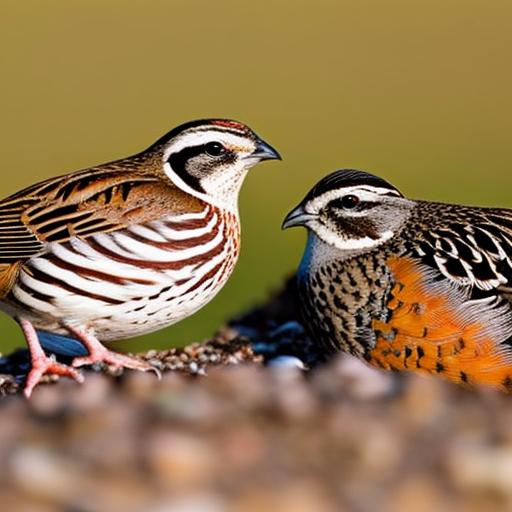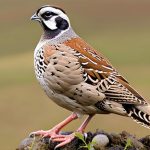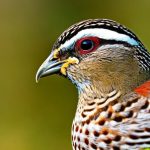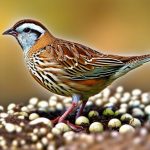Quail keeping is a rewarding and enjoyable hobby that has been gaining popularity in recent years. These small, ground-dwelling birds are known for their gentle nature and low maintenance requirements, making them an ideal choice for both novice and experienced bird keepers. Quails are also valued for their delicious eggs and meat, making them a practical addition to any homestead or small farm. Whether you are interested in raising quails for their eggs, meat, or simply as pets, there are a few key considerations to keep in mind when starting your quail keeping journey.
Quails come in a variety of species, including the popular Coturnix quail, also known as Japanese quail, as well as Bobwhite quail and California quail. Each species has its own unique characteristics and requirements, so it’s important to research the specific needs of the species you plan to keep. Quails are generally hardy birds that can adapt to a wide range of climates, making them suitable for keeping in various regions. With the right knowledge and preparation, quail keeping can be a fulfilling and enjoyable experience for bird enthusiasts of all levels.
Key Takeaways
- Quail keeping is a rewarding hobby that requires proper knowledge and care.
- Housing and enclosure requirements for quails include adequate space, protection from predators, and proper ventilation.
- Quails require a balanced diet of commercial feed, fresh water, and occasional treats like fruits and vegetables.
- Health and disease management for quails involves regular observation, proper sanitation, and prompt veterinary care when needed.
- Breeding and reproduction of quails can be a fascinating process, but it requires careful planning and monitoring.
Housing and Enclosure Requirements
When it comes to housing and enclosure requirements for quails, there are several important factors to consider. Quails are ground-dwelling birds that require ample space to roam and forage, so a spacious and secure enclosure is essential for their well-being. The size of the enclosure will depend on the number of quails you plan to keep, but as a general rule of thumb, each quail should have at least 1 square foot of space to ensure they have enough room to move around comfortably.
The enclosure should be predator-proof, with sturdy walls and a secure roof to protect the quails from potential threats such as predators and extreme weather conditions. Additionally, the flooring of the enclosure should be covered with a soft bedding material, such as straw or wood shavings, to provide a comfortable and clean environment for the quails. It’s also important to provide adequate ventilation and natural light within the enclosure to promote good air quality and overall well-being for the birds. Lastly, the enclosure should include areas for shelter, such as small huts or shelters, where the quails can seek refuge and rest.
Feeding and Nutrition
Proper feeding and nutrition are essential for the health and well-being of quails. A well-balanced diet is crucial to ensure that quails receive the necessary nutrients to support their growth, egg production, and overall health. A commercial quail feed that is specifically formulated for quails is an ideal option, as it provides the essential vitamins, minerals, and protein that quails need to thrive. Additionally, offering a source of grit, such as crushed oyster shells or granite grit, is important to help quails digest their food effectively.
In addition to commercial feed, quails can also benefit from a variety of fresh foods, such as leafy greens, fruits, and vegetables, which can be offered as occasional treats. It’s important to provide fresh, clean water at all times, as quails can quickly become dehydrated if they do not have access to an adequate water source. Monitoring the quails’ food intake and adjusting their diet based on their age, activity level, and reproductive status is important to ensure they receive the appropriate nutrition at all times.
Health and Disease Management
Maintaining the health of your quails is crucial for their overall well-being and productivity. Regular health checks and observation of your quails’ behavior can help you identify any signs of illness or distress early on. Common health issues in quails include respiratory infections, parasites, and nutritional deficiencies. It’s important to work with a veterinarian who has experience with poultry to develop a health management plan for your quails.
Preventative measures such as maintaining a clean living environment, providing a balanced diet, and practicing good biosecurity can help reduce the risk of disease in your quail flock. Additionally, quarantine new birds before introducing them to your existing flock to prevent the spread of potential diseases. Proper hygiene practices, such as regular cleaning of the enclosure and providing fresh bedding, are essential for preventing the buildup of bacteria and parasites that can compromise the health of your quails.
Breeding and Reproduction
Breeding quails can be a rewarding aspect of quail keeping, whether you are interested in expanding your flock or breeding for specific traits such as egg production or meat quality. Quails reach sexual maturity at around 6-8 weeks of age, at which point they can start laying eggs or mating with other quails. To encourage successful breeding, it’s important to provide a suitable nesting area within the enclosure where the female quails can lay their eggs in privacy.
Once the eggs are laid, they can be collected and placed in an incubator to hatch, or left with the mother quail to incubate naturally. Incubating quail eggs typically takes around 17-18 days before they hatch into adorable chicks. It’s important to provide a warm and safe environment for the newly hatched chicks, with access to chick starter feed and clean water. Proper care and attention during the breeding and hatching process can help ensure the health and vitality of the new quail chicks.
Quail Behavior and Socialization
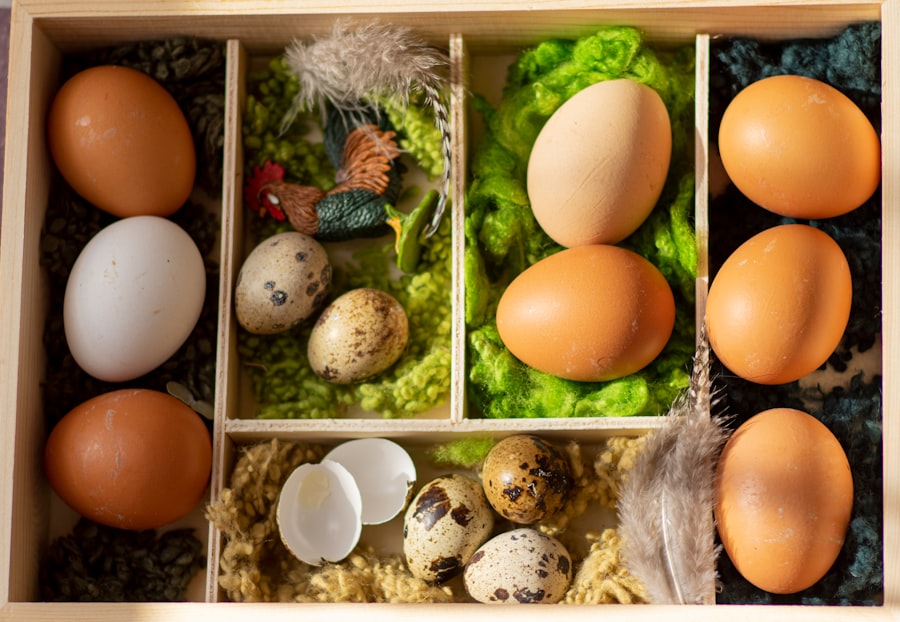
Quails are social birds that thrive in small flocks, so it’s important to provide them with companionship to support their well-being. When introducing new quails to an existing flock, it’s important to monitor their interactions to ensure they integrate smoothly without any aggression or bullying. Providing multiple feeding and watering stations within the enclosure can help prevent competition for resources among the quails.
Quails are also known for their gentle and docile nature, making them suitable for interaction with humans. Spending time with your quails and providing enrichment activities such as dust baths or foraging opportunities can help keep them mentally stimulated and content. Observing your quails’ behavior can also provide valuable insights into their health and well-being, as changes in behavior can indicate potential issues that require attention.
Is Quail Keeping Right for You?
Quail keeping can be a fulfilling and enjoyable hobby for bird enthusiasts of all levels. Whether you are interested in raising quails for their eggs, meat, or simply as pets, there are many rewards to be gained from caring for these charming birds. However, it’s important to consider the time, resources, and commitment required to ensure the well-being of your quails. With proper housing, nutrition, health management, and attention to their behavior and socialization needs, quail keeping can be a rewarding experience that offers valuable insights into the natural behaviors of these fascinating birds.
In conclusion, if you are willing to invest the time and effort into providing a suitable environment for your quails and meeting their needs on a daily basis, then quail keeping may be the right choice for you. The joy of collecting fresh eggs from your own flock or watching adorable quail chicks hatch can be incredibly rewarding for those who are passionate about caring for these delightful birds. Whether you are a beginner or experienced bird keeper, quail keeping offers a unique opportunity to connect with nature and experience the joys of raising these charming birds.
If you’re considering keeping quail, you might also be interested in learning about the best coop for chickens. Poultry Wizard has a helpful article on what kind of coop is best for chickens, which provides valuable insights into creating a suitable living space for your feathered friends. Understanding the housing needs of different poultry can help you ensure the comfort and well-being of all your birds.
FAQs
Are quail easy to keep as pets?
Quail can be relatively easy to keep as pets, as they are small and require minimal space compared to other poultry. They are also relatively low maintenance and can be kept in small backyard setups.
What kind of housing do quail need?
Quail require a secure and predator-proof housing, such as a coop or aviary, to protect them from predators. They also need access to a dry and clean area for dust bathing.
What do quail eat?
Quail are omnivores and their diet consists of a combination of commercial quail feed, seeds, grains, insects, and green leafy vegetables. It’s important to provide them with a balanced diet to ensure their health and well-being.
Do quail need special care or attention?
Quail require regular access to clean water, a balanced diet, and protection from predators. They also need regular cleaning of their housing to maintain a healthy environment.
Are quail noisy?
Quail are relatively quiet compared to other poultry, making them suitable for urban or suburban settings. However, they do make some noise, particularly the males during the breeding season.
Can quail be kept with other poultry?
Quail can be kept with other poultry, but it’s important to provide them with their own space within the coop or aviary to prevent any potential aggression from other birds. It’s also important to consider the specific needs and behaviors of each species when housing them together.
Meet Walter, the feathered-friend fanatic of Florida! Nestled in the sunshine state, Walter struts through life with his feathered companions, clucking his way to happiness. With a coop that’s fancier than a five-star hotel, he’s the Don Juan of the chicken world. When he’s not teaching his hens to do the cha-cha, you’ll find him in a heated debate with his prized rooster, Sir Clucks-a-Lot. Walter’s poultry passion is no yolk; he’s the sunny-side-up guy you never knew you needed in your flock of friends!

